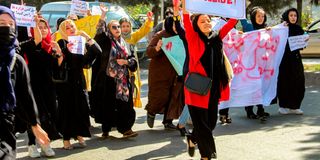Enough! Afghan women protest attacks on Shia Muslim minority

Afghan women display placards and chant slogans during a protest they call ‘Stop Hazara genocide’ a day after a suicide bomb attack at Dasht-e-Barchi learning centre, in Kabul on October 1, 2022.
What you need to know:
- A suicide bomber, last Friday attacked an educational institute in Kabul, killing 53 students, many of whom were young women.
- Afghan women in academia led demonstrations to protest relentless attacks on the Shia Muslim minority.
Women in Afghanistan on Monday took to the streets to protest relentless attacks on the Shia Muslim minority.
Last Friday, a suicide bomber attacked an educational institute in Kabul, killing 53 students, many of whom were young women.
The blast occurred in the Dasht-e-Barchi neighbourhood of western Kabul, a predominantly Shia Muslim area home to the minority Hazara community, Aljazeera reported quoting a police spokesman Khalid Zadran.
During Monday’s protest on the streets of city of Mazar-i-Sharif, a university professor Zahra Mosawi, who was among the marchers said they had “had enough.”
“After Friday’s attack on innocent girls in the Kaj education centre, we said we have had enough,” she told Al Jazeera.
The Afghan women in academia also led similar demonstrations in Kabul, Herat and Bamiyan.
A 2011 expert poll by TrustLaw found Afghanistan to be the most dangerous country for women in the world owing to dismal healthcare, brutal poverty and violence.
Biased policies
And life is not getting any better for the women and girls in this country.
After the Taliban takeover in August last year, the fundamentalist group has imposed biased policies and regulations putting a strain on the rights of girls and women.
Human Rights Watch (HRW) wrote in its 2022 World Report that although the Taliban claimed support for the education of girls and women, its policy that disallows girls and women in higher education to study together with boys and men, is repressive.
“A lack of female teachers, especially in higher education, likely means this policy will lead to de facto denial of access to education for many girls and women,” it wrote in the report.
It has also abolished the Ministry for Women’s Affairs and repurposed its building as the Ministry for the Propagation of Virtue and Prevention of Vice.
HRW describes the institution as one responsible for enforcing rules on citizens’ behaviour, including how women dress, and when or whether women can move outside the home unaccompanied by a male relative.
Recently, the group banned women from traveling beyond 45 miles without a male chaperone and also ordered them to cover their faces in public.





